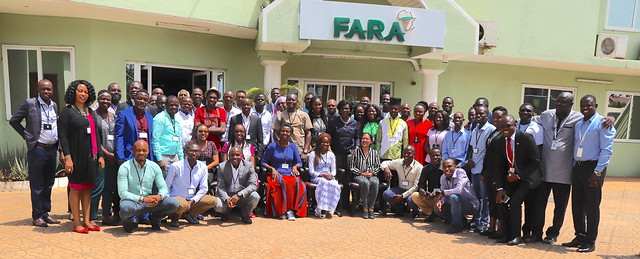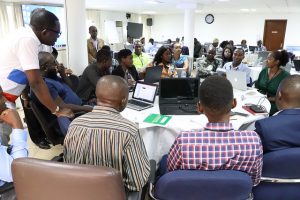TAAT: Leveraging technology for inclusive agripreneurship development in Africa

About 60 youths from across Africa gathered in Accra, Ghana, last week, for a 3-day agricultural engagement workshop on the theme: “Strategic Engagements and Capacity Development of Youth in Agri-preneurship for Technology Adoption,” aimed at leveraging shared experiences of youths to develop a framework for youth engagement with a focus on inclusive agripreneurship development.
According to the United Nations Food and Agriculture Organization (FAO), over 800 million people across the world are undernourished, with Africa accounting for more than 25% of the figures.
Africa`s population currently stands at 1.1 billion with youths constituting more than 50% of the continent’s total population, which is projected to rise to about 2.4 billion by 2050.
Although young people constitute majority of the continent’s population, most young Africans are either unemployed or underemployed and seldom consider agriculture as a means of livelihood.
Agriculture holds enormous potential for jobs creation among Africa’s burgeoning young population and consequently transforming the continent’s economy. However, African youths are yet to realize the profitable opportunities agriculture offers, as a source of earning sustainable livelihoods, hence the low-level of youth involvement in agriculture.
Hence, the Capacity Development and Technology Outreach compact (CDTO) of Technologies for African Agricultural Transformation (TAAT) – aims to bridge existing gap in the involvement of youths in agriculture through the implementation of youth engagement programmes focused on addressing issues of employment and agri-preneurship in Africa.
On this basis, about 60 young professionals in agriculture from across 26 African countries gathered in Accra, Ghana for a 3-day continental youth engagement workshop on the theme: “Strategic Engagements and Capacity Development of Youth in Agri-preneurship for Technology Adoption.”
Led by the Forum for Agricultural Research in Africa (FARA), the CDTO compact undertakes capacity building at all levels within partner institutions and within the TAAT Priority Intervention Areas (PIAs) and their value chains.
Funded by the African Development Bank (AfDB) as part of its ‘Feed Africa’ strategy and focused on the transformation of Africa’s agriculture and scaling up of agribusiness opportunities, TAAT’s main objective is to improve the business of agriculture across Africa by raising agricultural productivity, mitigating risks and promoting diversification and processing in 18 agricultural value chains within eight Priority Intervention Areas.
The programme increases agricultural productivity through the deployment of proven and high-performance agricultural technologies at scale along nine value chains which include rice, cassava, wheat, sorghum and millet, and maize. Others are high iron beans, orange-fleshed sweet potato, small ruminants as well as fish (aquaculture).
Amongst others, the objectives of the capacity building event was developing a set of guidelines for strategic engagement and capacity development for youths focused on agri-preneurship as well as scaling up technologies for increased agricultural productivity in Africa.
The workshop was hosted by FARA jointly with Young Professionals in Agricultural Research for Development (YPARD), and the West and Central Africa Council for Agricultural Research and Development (CORAF).
Irene Annor-Frempong, director in charge of research and innovation at FARA, who welcomed participants to the workshop said: “youths are the innovative power required to drive the transformation of Africa`s agriculture.”
She noted that “Technologies for African Agricultural Transformation (TAAT) will look at proven technologies, get them adapted, adopted and scaled by building the capacities of youths [in Africa].”
Although agriculture is the mainstay of Africa`s economy and accounts for about 70% of employment on the continent, it contributes only 25% of Africa’s gross domestic product (GDP). Consequently, millions of dollars are being spent annually on food importation.
“The TAAT programme is funded by the African Development Bank (AfDB) as part of its ‘Feed Africa’ strategy aimed at doubling agricultural productivity in Africa by 2025, in line with the United Nations Sustainable Development Goal 2 (SDG): ‘Zero Hunger,’ and also the African Union’s Agenda 2063 seeking to ensure food and nutrition security on the continent,” says Krishan Bheenick, lead specialist on capacity development at FARA cum coordinator of the CDTO Compact.
“We are here to support in terms of capacity development and technology outreach through the development of agri-preneurship so this workshop is about the process of agri-preneurship development,” said Bheenick.
“There was an essay competition among youths in Africa, last year. In specific terms, the YPARD network asked them to describe their experiences on youth engagement in agriculture. The idea [was] to identify what works best for youths in Africa. We therefore selected 35 initiatives [based on the essays] and we are here to utilize those initiatives that have been used to engage the youths.”
The Young Professionals for Agricultural Research Development (YPARD), a network of about 30, 000 youth members spread around the globe, is being hosted by the Global Forum on Agricultural Research and Innovation (GFAR) at the United Nations Food and Agriculture Organization (FAO) headquarters in Rome, Italy. It was launched in 2006 as a movement by the youths and for the youths to contribute towards innovative agricultural development.
“We are working to ensure that young people identify and seize opportunities across various agricultural value chains. TAAT is one of such opportunities for youths to exploit and we will capitalize on the experiences of the youths to develop strategies for engaging institutions to mainstream youths in agriculture,” says Sokhna Gaye Rokhaya, YPARD’s country representative in Senegal.
Pius Lutakome, a young Ugandan agricultural researcher, was one of the participants in the 3-day youth in agricultural entrepreneurship regional workshop. While working at the Gates Foundation-funded East Africa Dairy Development (EADD) program – designed to boost the milk yields and incomes of small-scale farmers in Africa (Kenya, Uganda and Tanzania) so they can lift their communities out of hunger and poverty.
“I observed that many young people in Uganda were unemployed and they`re not directly involved in agriculture. So, I came up with an idea to train youths in agricultural service provision. Last year, I wrote an essay describing my experiences, it was titled: Equipping youths with skills to start service provision enterprises (SPE`s) along the dairy value chain,” says Lutakome.
While speaking about his experience at the FARA workshop, Lutakome said they had been taken through “the process of experience

capitalization and framing. I have learnt how to frame my experience in terms of being clear and precise so that other young Africans can model my experience and embrace agriculture as a cool career because it is where the future lies for us.”
In 2014, Annet Nannono, another participant from Uganda, started vegetable farming on an acre of her family’s land. After two consecutive farming seasons, she failed to make any profit from her agribusiness, partly due to lack of adequate knowledge of business management, pests and insects control.
Following a failed attempt to secure funding for her business, Nannono joined the Uganda National Young Farmers Association (UNYFA), a youth-based capacity building platform on entrepreneurship and agribusiness which proved a turning point in her life.
“Being here has helped me to understand the critical importance of data in agriculture. As a technology savvy youth, I am interested in using ICT for agriculture but data has been a huge challenge for me. I don`t have enough data to be able to improve my work. So, being here is a big plus for me because I have learnt about data and I will commit myself to partnering with relevant organizations that will help me get the data I need,” says Nannono who works as operations officer at EZYAgric, an ICT-for-agriculture firm based out of Kampala, Uganda.
“This workshop has changed my perception about youth participation in agriculture. I [now] understand that sharing my experience can motivate many other young people to embrace agriculture. So, I am going to capitalize on and share my experience when I go back home,” added Nannono.
Achieving food and nutrition security in Africa as envisioned by the 2030 United Nations Sustainable Development Goals (SDGs) must necessarily involve the deployment of science, technology, and innovations (STI) in agriculture.
TAAT-CDTO`s engagement with youths involved in agricultural entrepreneurship is definitely a right step in the right direction, as a strategy for encouraging young Africans to embrace agriculture and leverage modern agricultural technologies for enhanced food productivity on the continent.


